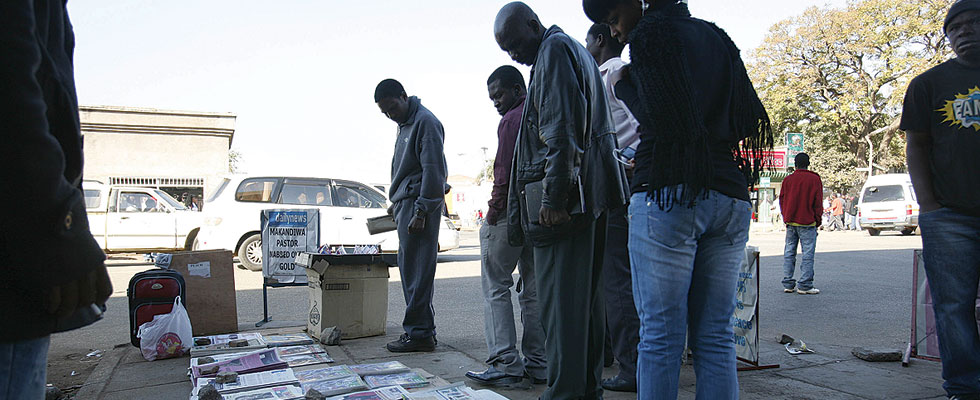
IN Zimbabwe, the media is either green or red and during election period, media houses nail their political colours to the mast.
Mail&Guardian
While ECF-Sadc said it was happy with the establishment of the Zimbabwe Media Commission (ZMC), meant to ensure that citizens enjoy fair and wide access to information among others, the body said the media was blatantly biased.
“The mission noted with concern the partisan and biased coverage given to some political parties and their candidates by both the public and private media,” ECF-Sadc mission leader advocate Notemba Tjipuja told journalists at a press conference last week.
“This undoubtedly compromised the guiding principles of equality, equity and fairness,” said Tjipuja. Two daily newspapers, The Herald and Daily News stand out with taking political sides.
The Herald is a Zanu PF mouthpiece, while the Daily News sings MDC-T leader Morgan Tsvangirai’s praises.
Media analyst Alexandre Rusero, a lecturer at Harare Polytechnic College, told the Mail & Guardian that the Zimbabwean media failed to practise what it’s supposed to.
“The media is a yardstick to assess democracy in any country. Sadly, in Zimbabwe, we’ve got something completely different.” Rusero said the Zimbabwean media started wearing political colours after the formation of the Movement for Democratic Change (MDC) in 2000, with the public media taking Zanu PF’s side and private media largely sympathising with the opposition.
- Chamisa under fire over US$120K donation
- Mavhunga puts DeMbare into Chibuku quarterfinals
- Pension funds bet on Cabora Bassa oilfields
- Councils defy govt fire tender directive
Keep Reading
He said the Daily News was formed “exactly six months after the formation of the MDC”.
“The position of the Daily News is as good as the position of the Herald. In a normal media environment this should not be the case. Different views should mix and mingle in the media,” said Rusero.
While being biased is acceptable in other countries, Rusero said in Zimbabwe the media is so bad “to the extreme of peddling lies about a certain politician or party that’s opposing their chosen side. Here, the media is going beyond biasedness and is undermining the intelligence of readers, insulting the public”.
While the political battle continued in newspapers, there was no television competitor for the country’s public broadcaster ZBC, which confidently takes Zanu PF’s side.
For each story, Mugabe is introduced as “head of state and government, commander-in-chief of armed forces, comrade, President Robert Mugabe”. No negative story is broadcast about the former liberation movement or its leaders and stories about them are hardly probed, while no positives are broadcast about the MDC.
However, Rusero said it’s unlikely that Zanu PF has got a hand in how the ZBC conducts itself. “We’ve got certain functionaries within State media who, for their own reasons, do this. They become over-enthusiastic and want to be seen as doing something the ruling party likes.”
But the fact that secretary for media, information and publicity George Charamba also doubles as president Mugabe’s spokesperson has contributed to ZBC’s way of covering news, Rusero said.
“It’s the agenda of the president first before it becomes the agenda of the public, but I don’t think this has got anything to do with Zanu PF directive,” he said.
Zimbabwean newspapers last week went all out campaigning for preferred candidates. Last Monday’s Daily News carried a frontpage headline saying, “Game over for Mugabe”.
The newspaper’s editorial, titled Mugabe must go, added to the bias. “We say unequivocally that Zimbabweans must retire this mature citizen (Mugabe). We desperately need new blood. It is nothing personal, but about the future of our country.”
The Herald was not about to be outdone. The newspaper’s voting day editorial blamed the MDC for Zimbabwe holding elections a month after the June 30 expiry of Parliament. Mugabe had been ruling by a presidential decree during this period.
The paper said the MDC is the party that doesn’t like going back to the people for a fresh mandate. “This is also the nation’s chance to punish the MDC-T and its western handlers for encumbering us with a ruinous sanctions regime over the past decade,” The Herald editorial read.
It used Wednesday for a last-minute opportunity to help its preferred candidate win the poll, publishing an article, titled Tsvangirai, man who spat in communal well, accusing the MDC-T leader of forgetting his people in his home village Humanikwa, in Buhera district.
Humanikwa villagers face water shortages, while he has funded an irrigation scheme at his mother’s home, The Herald reported.
“That Tsvangirai has failed to impress in his own backyard is telling enough of his unsuitability for the highest office in the land, for, do they not say charity begins at home?”
During the elections in Zimbabwe, the Zimbabwe Electoral Commission, working with the Zimbabwe Media Commission and the Broadcasting Authority of Zimbabwe, were charged with monitoring the country’s media to ensure that the conduct of political parties, candidates and journalists are “generally above board during this period”, said the ECF-Sadc in a statement.











